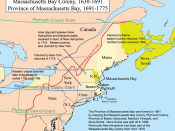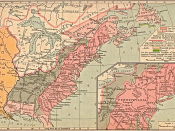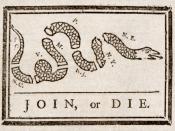The Great Awakening of the 1730's and 1740's that took place in the English Colonies in America changed the face of American religion and at the same time led the way for improvement of the educational and political systems of Colonial America. The Great Awakening took place just as the seeds of the Industrial Revolution were being sown on both the European and American continents. It brought a new theatrical aspect to previously stark and often boring church ceremonies, sometimes reminiscent of the performances of religious leaders in ancient civilizations. Preachers who had in earlier years spoken only of predetermination now spoke of it in conjunction with hellfire and the revenge of an angry God, played off the emotions of parishioners, and routinely brought forth confessions from the most practiced sinners. At an early point of the European Age of Enlightenment, a new wave of religious devotion swept the New World.
The religious interest of the pilgrims had so waned since the original settlements at Plymouth and Massachusetts Bay Colony that the rhetoric skills of a few talented men were enough to send tremors of faith throughout the colonies.
In the decades preceding the Great Awakening, the focus of daily life in the colonies shifted from religion to more pressing and aesthetic pursuits. The pilgrims who had come for freedom of worship had found it, and now they could afford to let their attention wander. Members of the clergy still held much power, but they were not omnipotent by any means. The colonists, having seen what ills came from allowing a religiously motivated monarch to rule England, decided to prevent the same fate from befalling their newly founded religious haven. Thus, New England clergy members were not allowed to hold political positions in the community. Yet another danger to the...



The great awakening
This is but a great essay,the writer has really exposed a whole lot of things here.In the previous era life was diferent and worship was also different.religion was like a tool for over-controlling the people.
But it actually did worked because it curtailed evil behaviours in people and evoked a feeling of truism in the lives of the people.the age of enlightenment severely brought with it some goodies.yet,preachers like John Calvin did a whole lot in their predeterministic doctrines.i would say it enhanced a whloe lot.in view of this the writer did not really bother to say the evils that were associated with these,for i am certain so many must had paid the prices of heresy and false accusations.
By and large,the whole movemment of the great awakening engendered so much development and enlightening of the minds of people,taking schools,i mean universities into account.Even though Karl Marx had said that religion is the "heart of the heartless,the moan of the moanless,the opium of the masses",it is arguable that religion,in fact the great awakening transformed the face of the earth,even though it was also used as a disguise to colonise and usurp the resources of the Africans.
1 out of 1 people found this comment useful.